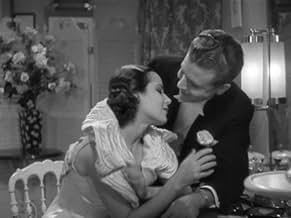Aggiungi una trama nella tua linguaHarry and Inez are dance partners at Wonder Bar. Inez loves Harry, but he's in love with Liane, a wealthy businessman's wife.Harry and Inez are dance partners at Wonder Bar. Inez loves Harry, but he's in love with Liane, a wealthy businessman's wife.Harry and Inez are dance partners at Wonder Bar. Inez loves Harry, but he's in love with Liane, a wealthy businessman's wife.
- Premi
- 1 vittoria e 1 candidatura
Dolores Del Río
- Inez
- (as Dolores Del Rio)
Grace Hayle
- Fat Dowager
- (scene tagliate)
Avis Adair
- Chorus Girl
- (non citato nei titoli originali)
Trama
Lo sapevi?
- QuizAl Jolson insisted on singing the opening number Vive la France live on set, as he claimed it would be impossible to do the song justice if was filmed miming to playback, in order to deliver it with the excitement and verve that only he could bring to it. Even though this presented considerable technical problems, Warner Brothers agreed (that's the real studio orchestra actually on set playing the house band of the Wonder Bar) and this is one of the very last musical numbers to be performed live on camera.
- Curiosità sui creditiThe opening credits appear as the respective actors enter the nightclub through a revolving door.
- ConnessioniEdited into Clean Pastures (1937)
- Colonne sonoreAll Washed Up
(1934) (uncredited)
Music by Harry Warren
Instrumental dance number (after Jolson sings "Vive La France")
Recensione in evidenza
"Wonder Bar" is a good musical from 1934 which held my interest throughout the course of the film. The comedic sequences were fine and Busby Berkeley's choreography was very good, but not quite up to the standards he set in such films as "Gold Diggers of 1933." The sequence where is Al Jolson is in blackface and goes up to heaven is a bit dated, but the film was made in 1934 and one must keep that in mind when viewing the film.
One reviewer take issue with this film calling it "a bad movie," which it is not. The review goes on to discuss "the second huge production number will likely make politically correct folks explode! It's because it's a super-offensive blackface story where the characters are all walking embodiments of the worst stereotypes about black people." According to Wkipedia, Black people were not all that offended by Jolson's use of blackface. Film historian Charles Musser writes "In an era when African Americans did not have to go looking for enemies, Jolson was perceived as a friend."
One reviewer take issue with this film calling it "a bad movie," which it is not. The review goes on to discuss "the second huge production number will likely make politically correct folks explode! It's because it's a super-offensive blackface story where the characters are all walking embodiments of the worst stereotypes about black people." According to Wkipedia, Black people were not all that offended by Jolson's use of blackface. Film historian Charles Musser writes "In an era when African Americans did not have to go looking for enemies, Jolson was perceived as a friend."
- film_poster_fan
- 26 ago 2023
- Permalink
I più visti
Accedi per valutare e creare un elenco di titoli salvati per ottenere consigli personalizzati
- How long is Wonder Bar?Powered by Alexa
Dettagli
- Data di uscita
- Paese di origine
- Lingue
- Celebre anche come
- Čaroban bar
- Luoghi delle riprese
- Azienda produttrice
- Vedi altri crediti dell’azienda su IMDbPro
Botteghino
- Budget
- 675.000 USD (previsto)
- Tempo di esecuzione1 ora 24 minuti
- Colore
- Mix di suoni
- Proporzioni
- 1.37 : 1
Contribuisci a questa pagina
Suggerisci una modifica o aggiungi i contenuti mancanti

Divario superiore
By what name was Wonder Bar (1934) officially released in India in English?
Rispondi





































